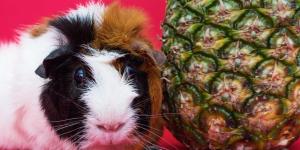Is My Guinea Pig Sick?


Have you recently adopted a guinea pig and are wondering how to care for it? If you have a guinea pig it is very important to make sure that you maintain its health accordingly. If you believe that your guinea pig may be ill, we suggest consulting your veterinarian as soon as possible. If they are suffering from: walking difficulties, slow movements or no movement at all, urinary inconsistency, or more, it is important that you know what to do.
In order to help you, here at AnimalWised, we will be discussing how to know if your guinea pig is sick. It is important for you to be able to identify the symptoms are and how to act accordingly.
General symptoms of a sick guinea pig
One of the best ways to know if your guinea pig is ill is by following your intuition. If you believe that your guinea pig has changed its habits and is performing some daily tasks differently, its best to assume that it may be ill. If this is the case, even if you're not sure, we recommend visiting a your vet as soon as possible for a consultation. Guinea pigs are incredibly sensitive animals, therefore, an illness in a guinea pig can worsen rapidly and must be attended to immediately.
Guinea pigs are usually vital and active animals, if your guinea pig is suddenly quiet, losing its appetite or moaning: do not ignore them.

Vitamin C deficiency in guinea pigs
It is necessary that your guinea pig's diet includes the required amount of vitamin C, as these animals are unable to synthesize this vitamin. A lack of Vitamin C can result in scurvy in guinea pigs.
Symptoms of scurvy in guinea pigs includes;
- Anorexia
- Weight loss
- Open wounds
- The appearance of hemorrhages
- Alopecia
- An unhealthy coat
- Limping
- Diarrhea
- Tooth loss
Scurvy in guinea pigs requires veterinary assistance and generally supplementation.
Symptoms of respiratory problems in guinea pigs
Due to a guinea pig's anatomical characteristics, they are prone to suffering from respiratory problems and pulmonary tumors. Bacteria, viruses, fungi, tumors, toxins, heat stroke or heart disease are among the causes. Symptoms of respiratory problems in your guinea pig include: sneezing or ocular and nasal discharge. If you notice these symptoms in your guinea pig, we recommend visiting your veterinarian. If such respiratory infections are left untreated, they can result in pneumonia.

Signs of heart problems in guinea pigs
Guinea pigs are also known to suffer from heart problems. Characteristic symptoms of heart problems in guinea pigs include: tachycardio (rapid heartbeat), pallor of mucous membranes, general weakness, intolerance to exercise or the appearance of abdominal swelling (ascites). Since some of these symptoms can have several causes, it is essential that a veterinarian locates the origin of the problem in order to treat it successfully.
Symptoms of digestive problems in guinea pigs
Digestive problems in guinea pigs can cause both diarrhea and constipation. In the first case, they will eliminate liquid stools more often than usual. Constipation will appear as the opposite, that is, they will not produce any excrement at all and if they do, it will be done with difficulty. You will also be able to notice that its belly will appear swollen or there will be an appearance of parasites in its feces.
In order to know whether your guinea pig is ill, it is important to pay attention to its digestive system. Any apparent abnormality should be evaluated by a veterinarian. In order to treat digestive problems accordingly and prevent any future pathologies, it will be important to establish a balanced diet: adequate to your guinea pig's needs. It is also important to make sure that you follow your guinea pig's deworming and vaccination schedule strictly, to avoid parasites and worms.
When speaking of digestive problems in guinea pigs, we also have to include oral problems which produce symptoms of anorexia. Such oral symptoms include; pain, thinning, tooth loss, malocclusion, hyper-salivation or lumps. These oral problems will make it difficult for your guinea pig to eat, and therefore, they can suffer from both malnutrition or weight-loss.

Skin problems in guinea pigs
The appearance of: pruritus, lesions, fat, scaling, scabs, alopecia, darkening or thickening of the skin or pads on your guinea pig, may appear localized or generalized. The symptoms may appear due to the existence of a skin alteration. This may be due to the presence of: parasites, fungi or some endocrine disorder. Any of these symptoms can help us distinguish if our guinea pig might be ill, and provides enough reason for veterinary consultation.
As we have already mentioned, in order to avoid any of these pathologies, it is important to consult a veterinarian and schedule an appropriate deworming calendar/schedule.
Is my guinea pig dying?
Although with aging, it is normal to observe; difficulty breathing, slow movements, total absence of movement and/or urinary inconsistency: we still advise not ignoring these symptoms. If such symptoms are ignored, it can result in the death of your guinea pig. Many of these pathologies, if worsened, become incurable. Therefore, they need to be looked at as soon as they appear.
This article is purely informative. AnimalWised does not have the authority to prescribe any veterinary treatment or create a diagnosis. We invite you to take your pet to the veterinarian if they are suffering from any condition or pain.
If you want to read similar articles to Is My Guinea Pig Sick?, we recommend you visit our Other health problems category.








